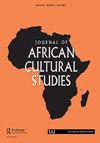Keguro Macharia:论对肯雅塔的性别、性和种族形象的磨擦、摩擦和制造摩擦
IF 0.7
2区 社会学
Q2 CULTURAL STUDIES
引用次数: 1
摘要
Keguro Macharia的作品——他的博客,Gukira和其他在线写作,他的Twitter feed,以及现在,他期待已久的文本,Frottage:黑人散居中的亲密摩擦——总是挑战我们想象自由及其与情色的关系。在《弗洛塔奇》一书中,马查里亚为现有的关于散居和黑人的历史和理论增添了新的元素,要求读者将性和性行为、性别建构、欲望和色情作为黑人自由斗争的核心因素。对于马查里亚来说,“frottage”提供了一个隐喻和一种方法,用于“把握种族内部经验的日常经验、摩擦和愤怒、翻译和误译,以及黑人通过快乐和游戏以及对反黑人的抵抗而融合在一起的时刻”(马查里亚2019,7)。历史与历史摩擦——点燃了一些版本,同时磨损或抹去了其他版本。在关注革命斗争和“自由思想”中的四位人物——弗朗茨·法农、雷诺·马兰、乔莫·肯雅塔和克劳德·麦凯的章节中,马查里亚说明了在历史上主导“散居相遇的愿景”(64)的异性恋关系和亲属模式的前景如何限制了我们对黑人自由斗争的理解。这是权力等级不断变化的时刻,人们相互联系的方式(包括性)受到了根本性的影响。在这个观点的基础上,马查里亚问道:那么,我们如何将“情爱的愉悦和多样性作为自由的实践,将流散相遇的主流观点复杂化为异性规范的亲属关系”(64)?如果我们要“扩大离散邂逅的词汇和框架,包括情人、性交伙伴和诡计……(和)一系列的情欲和遭遇”(64),我们如何重新定义争取自由的斗争,以及自由的实践?通过阅读他的博客Gukira,我们中的许多人都知道马查里亚写作中的诗学和政治——他的文章将自由理论化,想象身体和心灵找到通道的方式,即使在政治法令和权力结构试图阻止它们的时候。正如林赛·格林-西姆斯在她的投稿中所写,马查里亚的学术写作和他与博客文化的亲密接触说明了他的情结本文章由计算机程序翻译,如有差异,请以英文原文为准。
Keguro Macharia: On Grinding, Grating, and Creating Friction against Kenyatta’s Figurations of Gender, Sexuality, and Ethnicity
Keguro Macharia’s body of work – his blog, Gukira and other online writing, his Twitter feed, and now, his long-awaited text, Frottage: Frictions of Intimacy across the Black Diaspora – has always challenged us to imagine freedom and its relationship to the erotic. In Frottage, Macharia adds new elements to existing histories and theories of diaspora and blackness, asking readers to consider sex and sexuality, gender-construction, desire, and eroticism as central elements of Black freedom struggles. For Macharia, “frottage” presents a metaphor and a methodology for “grasp[ing] the quotidian experience of the intra-racial experience, the frictions and irritations and translations and mistranslations, the moments when blackness coalesces through pleasure and play and also by resistance to anti-blackness” (Macharia 2019, 7). Histories rub up against histories – igniting some versions, while wearing down or erasing others. In chapters focused on four figures in revolutionary struggles and “freedom thinking” – Frantz Fanon, René Maran, Jomo Kenyatta, and Claude McKay – Macharia illustrates how foregrounding heteronormative relationships and kinship models, which have historically dominated “visions of diasporic encounter” (64), has limited our understanding of Black freedom struggles. These were moments when hierarchies of power were continually shifting, and people’s ways of relating to each other (including erotically) were fundamentally affected. Expanding on that idea, Macharia asks: how, then, might we situate “erotic pleasure and diversity as practices of freedom, complicating dominant visions of diasporic encounter as heteronormative kinship” (64)? If we were to “enlarge the vocabularies and frames of diasporic encounter to include lover, fuck buddy, and trick... [and] a range of erotic desires and encounters” (64), howmight we re-conceptualise struggles for freedom, and practices of freedom? Many of us know the poetics and politics of Macharia’s writing – essays theorising freedom, imagining the ways bodies and psyches find passage, even when political decrees and power structures attempt to immobilise them – through reading his blog, Gukira. As Lindsey Green-Simms writes in her contribution, Macharia’s academic writing and his intimate engagements within blogging culture are illustrative of his complex
求助全文
通过发布文献求助,成功后即可免费获取论文全文。
去求助
来源期刊

Journal of African Cultural Studies
Multiple-
CiteScore
1.70
自引率
10.00%
发文量
13
期刊介绍:
The Journal of African Cultural Studies publishes leading scholarship on African culture from inside and outside Africa, with a special commitment to Africa-based authors and to African languages. Our editorial policy encourages an interdisciplinary approach, involving humanities, including environmental humanities. The journal focuses on dimensions of African culture, performance arts, visual arts, music, cinema, the role of the media, the relationship between culture and power, as well as issues within such fields as popular culture in Africa, sociolinguistic topics of cultural interest, and culture and gender. We welcome in particular articles that show evidence of understanding life on the ground, and that demonstrate local knowledge and linguistic competence. We do not publish articles that offer mostly textual analyses of cultural products like novels and films, nor articles that are mostly historical or those based primarily on secondary (such as digital and library) sources. The journal has evolved from the journal African Languages and Cultures, founded in 1988 in the Department of the Languages and Cultures of Africa at the School of Oriental and African Studies, London. From 2019, it is published in association with the International African Institute, London. Journal of African Cultural Studies publishes original research articles. The journal also publishes an occasional Contemporary Conversations section, in which authors respond to current issues. The section has included reviews, interviews and invited response or position papers. We welcome proposals for future Contemporary Conversations themes.
 求助内容:
求助内容: 应助结果提醒方式:
应助结果提醒方式:


